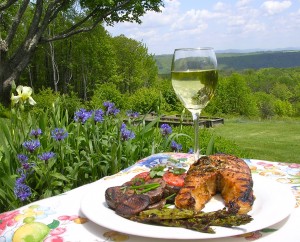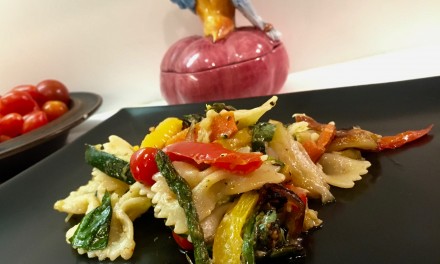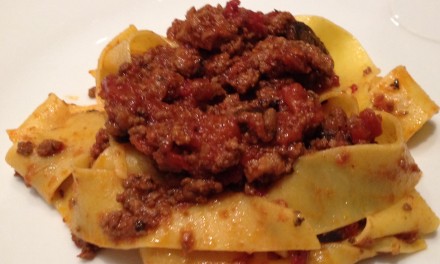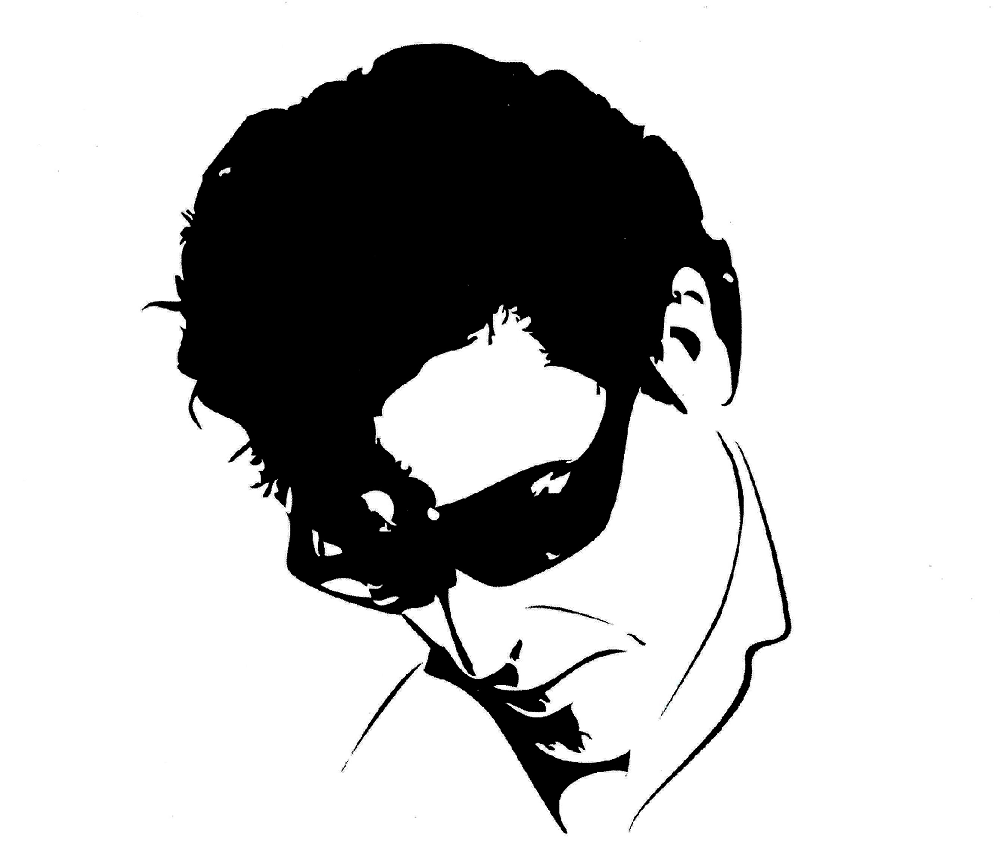Grilled Salmon Marsala with Grilled Vegetables in World War II
My Dad told me that when his platoon was going across France behind General Patton in World War II, the towns they liberated were really grateful. How grateful?
In one town, as they went past an exuberant, cheering crowd, a woman grabbed my Dad, dragged him into her bedroom and made love to him right then and there.
Now that’s gratitude.
Before the war, my Dad was drifting. He went to St. John’s College in Annapolis, Maryland. He wasn’t a good student. They put him in charge of the college café. He took some money out of the coffers, and in a valiant effort to try and double the cash, lost it all in a late-night poker game. He was asked to leave the school.
Soon after, he joined the Army and went to Europe to fight in World War II. It was a hellish and brutal experience that made my Dad a man. His father, Romollo, died of a heart attack while my father was away at war. They were close; he couldn’t go back for the funeral. It was one of the loneliest times of my Dad’s life.
After the war, he went back to St. John’s. He became a good student. He graduated. He went to law school. He became a lawyer. He did all of this with no money — he was the son of poor Italian immigrants.
He became a member of the U.S. Commission on Civil Rights. He helped start the Peace Corps. He wrote speeches for Vice President Hubert Humphrey. He became a professor of philosophy and literature.
World War II, the toughest time of his life, turned out to be his proudest moment, the turning point that changed his life in the best way possible.
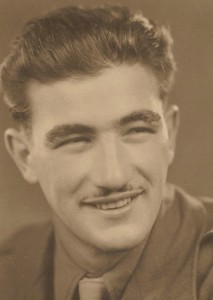 My Dad was in the XVth Corps; they followed General Patton’s 3rd Army through France, liberating town after town. One of the towns the XVth Corps liberated was Lunéville, a small town in northeastern France, about 50 miles from the German border. Lunéville was still being bombed and strafed by the Germans. My Dad was patrolling the streets one day, when he heard a German Stuka approaching. Stukas were small bombers, two-seaters that also had machine guns. My Dad saw a one-armed Frenchman, frozen with fear.
My Dad was in the XVth Corps; they followed General Patton’s 3rd Army through France, liberating town after town. One of the towns the XVth Corps liberated was Lunéville, a small town in northeastern France, about 50 miles from the German border. Lunéville was still being bombed and strafed by the Germans. My Dad was patrolling the streets one day, when he heard a German Stuka approaching. Stukas were small bombers, two-seaters that also had machine guns. My Dad saw a one-armed Frenchman, frozen with fear.
My Dad ran over, grabbed the Frenchman, and pushed him to the ground and covered him, bombs exploding, bullets flying. When the Stuka passed, the guy thanked my Dad, and insisted he come to dinner. My Dad spoke French; he had acted as an interpreter for the Army on quite a few occasions. He accepted the invitation. That night, my Dad had dinner with the Frenchman and his wife in their modest home. They sat and drank plum brandy after dinner as the Frenchman, a former captain in the French Army in World War I, told stories. He was a decorated war hero who had lost his arm in World War I. The German army had recently ransacked his home, taking his car and guns and war medals.
Things got quiet when the captain started talking about his daughter, Jacqueline. He started crying as he explained that Jacqueline had been visiting a friend in a nearby town when the D-Day invasion took place and all hell broke loose. He hadn’t heard from her since. He feared the worse. He wanted to try and find his daughter, but the Germans had taken his car and guns. The Frenchman showed my Dad a photo. She was beautiful. My Dad offered to see what he could do to bring the daughter back. The Frenchman and his wife were ecstatic.
My Dad left and went back to the makeshift barracks. He told the story of Jacqueline to his buddy Frank. He told Frank that he had offered to try and rescue Jacqueline. Frank thought my Dad was crazy. Or drunk. Or both.
The next day, my Dad dragged Frank to see the French captain. My Dad told him they’d need a map, the address of the place Jacqueline had last visited, a letter from the captain so Jacqueline would know who they were, and the photo. The French captain gave them everything plus a 5,000-franc note for Jacqueline.
My Dad and Frank left, and went back to the barracks. They were both on a two-day leave. Frank reluctantly agreed to help. But they didn’t have a jeep. They went over to the nurses quarters after sundown, figuring there might be a few male visitors who might have “borrowed” a jeep to get there.
Frank and my Dad found a jeep and rolled it down the hill and started it. It had a mounted machine gun between the seats. The headlights had been blackened into little slits, and were of little use. They drove in the night. It started to rain. The windshield had been removed, so visibility was low. There were small pockets of German soldiers still in the area, and there were rumors of German soldiers dressed as civilians.
My Dad and Frank were trying to get to Heudicourt-sous-les-Cotes, a small town about 60 miles away where Jacqueline had last visited. The rain and the lack of visibility slowed them down; they made it halfway there, soaked to the bone and dead-tired. They slept on the floor of a roadside house that belonged to a Frenchwoman who let them doze in front of her fireplace, so they could dry off and rest.
The next day they made it to Heudicourt. They went to the address and showed the woman the photo and the letter. She explained that Jacqueline had caught a ride a few days before to stay with an uncle in Verdun, a small town 25 miles to the north. She gave them the address, and my Dad and Frank took off
Verdun is close to the German border. It had recently been liberated by the Allies, but was still being attacked by the Nazis.
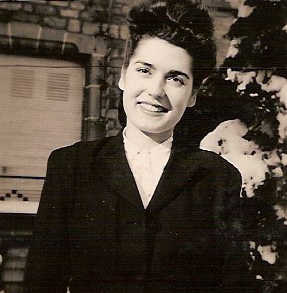 Frank and my Dad made it to Verdun, and found Jacqueline at her uncle’s house. My Dad gave her the letter and the 5,000-franc note. She started crying. Then she packed a small bag, said goodbye to her uncle, and my Dad put her in the back of the jeep and covered her with a blanket. There were still clusters of German soldiers roaming about. My Dad and Frank took off, Frank driving, machine gun mounted between them, Jacqueline in the back, bouncing around under the blanket as the jeep flew down the small country roads.
Frank and my Dad made it to Verdun, and found Jacqueline at her uncle’s house. My Dad gave her the letter and the 5,000-franc note. She started crying. Then she packed a small bag, said goodbye to her uncle, and my Dad put her in the back of the jeep and covered her with a blanket. There were still clusters of German soldiers roaming about. My Dad and Frank took off, Frank driving, machine gun mounted between them, Jacqueline in the back, bouncing around under the blanket as the jeep flew down the small country roads.
They stopped at a town called Metz to gas up at an American motor pool. The MPs warned them about groups of German soldiers. As they were getting ready to take off, Jacqueline poked her head out. The MPs saw her. Before they could react, Frank floored the jeep and drove like mad to Lunéville . They got there at midnight. Frank dropped off my Dad and Jacqueline at her house and took the jeep back.
Jacqueline ran inside and there were tears and laughter and hugs and shrieks of joy. My Dad stood in the doorway. The one-armed Frenchman kept pumping his one good arm in the air, crying and screaming, “Merci, Philippe! Merci, Philippe!”
GRILLED SALMON MARSALA AND GRILLED VEGETABLES
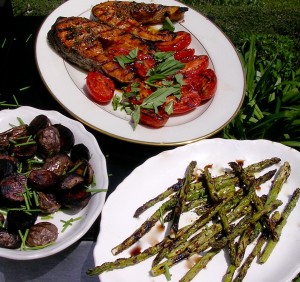 I was at my Dad’s house when I concocted this recipe. It was Memorial Day weekend. He lives on top of a mountain, in the Catskills of New York. It’s incredibly beautiful. It’s also incredibly isolated – which can make you crazy after a while. Just look at me.
I was at my Dad’s house when I concocted this recipe. It was Memorial Day weekend. He lives on top of a mountain, in the Catskills of New York. It’s incredibly beautiful. It’s also incredibly isolated – which can make you crazy after a while. Just look at me.
When my Dad first got the place, he wanted it to be rustic. And that it was. It was just a square, cinderblock two-story structure that looked more like a garage than a cabin. The ground floor was well, it was the ground. It was dirt. The second floor was unpainted plywood, and there was a gas stove up there, and that’s where I slept.
The stove is what we used for heat. For the whole place. Keep in mind; it gets down to below zero in the winter. There’s snow on the ground from November until March. And there was no plumbing. None. There was an outhouse, and it was pretty scary; especially late at night, when you had to walk 50 yards through the snow to go to the bathroom. That’s the way my Dad wanted it. Rough. No frills. No phones. No TV.
That didn’t last very long. The thought may have been romantic, but there’s nothing romantic about getting up in the morning and walking across the frozen tundra to go to the bathroom in what is really just a hole in the ground. A stinking hole.
And now? My Dad has three bathrooms, all indoors. The one on the second floor has a claw-foot bathtub with a view of the mountains. He has a big screen hi-definition TV, a satellite dish that gets a thousand channels, and the whole house has wireless internet. He has a phone. He even has a cell phone now. Now my Dad is all plugged in, hooked up, and well connected, which is a good thing, especially during the brutal winter months.
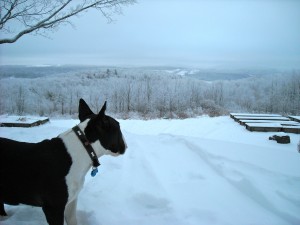 Rat Tail Ridge is a great place to grill in the summer, when it’s cool and breezy on top of that mountain. You’ve got a beautiful view, quite breathtaking. Batu loves it up there.
Rat Tail Ridge is a great place to grill in the summer, when it’s cool and breezy on top of that mountain. You’ve got a beautiful view, quite breathtaking. Batu loves it up there.
Note: the salmon steaks I used were about an inch and a half thick. Keep in mind that thicker pieces of salmon take longer, and thinner pieces take less time. Also, some grills run real hot, some not-so-hot. No wonder it took me so long to get this recipe right. But I finally nailed it.
Also, trim your asparagus. Grab an asparagus spear. Hold the top end in between the forefinger and thumb of your left hand, and hold the bottom end with the thumb and forefinger of your right hand, and bend until it breaks. Throw away the stalk end.
There are two kinds of Marsala—sweet and dry. Sweet is the way to go. Sweet!
Ingredients:
For the sauce
1 cup sweet Marsala (a wine from Sicily) or sweet vermouth
¼ cup extra virgin olive oil
¼ cup fresh squeezed lemon juice (use ripe, soft lemons, or Meyer lemons—remove the seeds)
1 tablespoon chopped fresh oregano, plus a couple sprigs for garnish (you can use a teaspoon of dried oregano if you can’t find fresh)
2 cloves of garlic
For the salmon and vegetables
4 salmon steaks
A dozen small potatoes cut in half (I used purple potatoes–found them in a local market)
A bunch of asparagus (16 or so), trimmed
6 Roma tomatoes cut in half length-wise
Extra virgin olive oil
Kosher salt
Fresh ground black pepper
A small bunch of fresh chives
A handful of fresh basil leaves
1 tablespoon of balsamic vinegar
Here we go…
Add all the sauce ingredients (except the garlic) in a small bowl. Mix. Put the garlic in a garlic press, and squeeze it into the sauce—you can also mince the garlic if you don’t have a press. Put the sauce in a small pan over low heat, and let it reduce while you grill.
Rinse off the salmon steaks, pat dry with paper towels, and drizzle both sides with olive oil. Then give a shake of salt and pepper on each side.
Keep your vegetables on separate plates. Take the potatoes, drizzle with olive oil, add salt and pepper, and make sure they’re coated well. Do the same with the asparagus, and the tomatoes – but be gentle. Don’t mangle your ‘maters.
Heat your grill up! We want it to be medium heat; if it’s too hot, things will burn.
The potatoes take the longest, about 20 minutes. Put them on first, cook for 10 minutes (depending on the heat of the grill) and then turn ’em over.
Put the asparagus and the salmon on the grill, and cook for about 5 minutes. After 5 minutes, turn over the asparagus and the salmon.
Add the Roma tomatoes to the grill, flat side down.
Cook the asparagus, salmon and tomatoes for 5 minutes. Don’t turn over the tomatoes!
Remove everything to a gorgeous platter.
Use a scissors and snip some fresh chives on top of the potatoes.
Snip some fresh basil on the tomatoes.
Drizzle a little balsamic vinegar on the asparagus.
Dish it up! Put a salmon steak on a plate. Take the reduced Marsala sauce and drizzle some on top. Add some asparagus, potatoes, and tomatoes. Garnish with a fresh oregano sprig.
MANGIAMO!!!!!

